| Reviews & Columns |
|
Reviews DVD TV on DVD Blu-ray 4K UHD International DVDs In Theaters Reviews by Studio Video Games Features Collector Series DVDs Easter Egg Database Interviews DVD Talk Radio Feature Articles Columns Anime Talk DVD Savant Horror DVDs The M.O.D. Squad Art House HD Talk Silent DVD
|
DVD Talk Forum |
|
|
| Resources |
|
DVD Price Search Customer Service #'s RCE Info Links |
|
Columns
|
|
|
Films of Nikita Mikhalkov: Volume 1, The
The staleness of Mikhalkov's oeuvre, if you can call it that, hasn't dissuaded Kino International from releasing what threatens to be the first of multiple box sets of the director's films. Entitled The Films of Nikita Mikhalkov: Volume 1, this first release includes two of the director's best known films, Burnt by the Sun (1994) and Oblomov (1980), as well as three lesser lights appearing for the first time in North America on DVD -- A Slave of Love (1976), Five Evenings (1979), and Without Witness (1983).
A Slave of Love (94 min., 1.33:1, 1976)
The Soviet Brezhnev era's version of the romantic-comedy, Slave of Love is a costume-drama about cross-starred lovers thwarted by anti-Bolshevik, counter-revolutionaries. Silent screen diva Olga Voznesenskaya (Yelena Solovey) falls for the mysterious and handsome cameraman Victor Pototsky (Rodion Nhaapetov) while location shooting in the Crimea, but Victor has a secret that will lead to Olga's political awakening but his doom.
Slaves of Love earns high marks as Soviet propaganda, but falls short as a rom-com for its mirthless action, clichéd characters, and lack of spark between its leads.
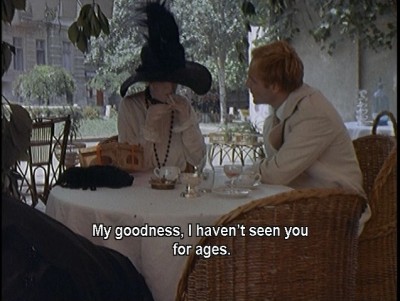 | 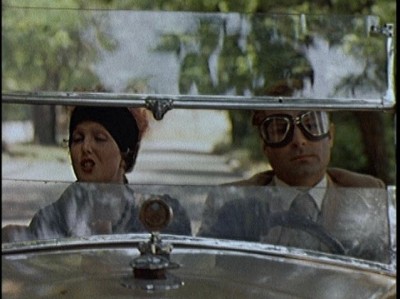 |
Five Evenings (103 min., 1.33:1, black and white, 1979)
A low-budget film quickly made during a break in the shooting of Oblomov, Five Evenings is a melodrama set late '50's Moscow concerning two old lovers meeting for the first time since being separated by the war 17 years earlier.
While visiting Moscow, Aleksandr (Stanislav Lyubshin) chances upon Tamara (Lyudmila Gurchenko). Though the two had only enjoyed a brief romantic fling seventeen years earlier, it's immediately apparent that neither has gotten over the other. Tamara, a factory shop steward, now lives with her college-age nephew in a Khruschev-era communal apartment. Wanting to appear successful, Aleksandr presents himself to Tamara as a chief engineer, but is actually a government chauffeur in a desolate outpost in Siberia. Over five acts, each corresponding to one of Aleksandr's five nights in Moscow, the pair seek against the odds a second chance at happiness.
With close attention to detail in the period set dressing, as well as forlorn life stories designed for maximum audience empathy, Five Evenings was a bittersweet bit of nostalgia perfectly suited to its audience's self-pitying sensibilities, but without much substance some thirty years on.
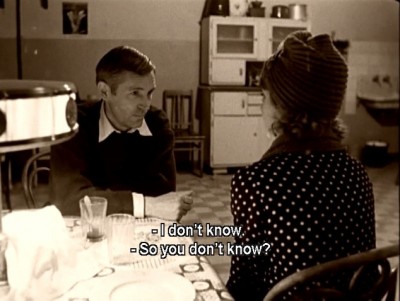 | 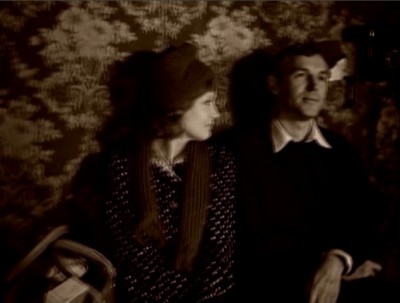 |
Oblomov (142 min., 1.37:1, 1980)
The most enduring of Mikhalkov's films, Burnt by the Sun notwithstanding, Oblomov is a romantic-comedy set in the waning years of the Tsarist age that transcends its conventional love-triangle plot thanks to a couple of well-drawn and well-performed characters -- the indolent aristocrat Ilya Ilyich Oblomov (Oleg Tabokov) and his crusty manservant Zakhar (Andrei Popov).
Approaching late middle-age, Oblomov is the absentee landlord of a declining estate, without a career or family, who sleeps away as much of his days as he can, rarely leaving his St. Petersburg apartment. His childhood companion Andrei Ivanovich Stoltz (Yuri Bogatyryov) is his only friend, apart from his cantankerous old manservant Zakhar. Stoltz is everything that Oblomov is not -- handsome, successful, dashing, and adventurous -- yet their friendship is genuine.
Stoltz enlists the genteel heiress Olga (Yelena Solovey) to save Oblomov from himself while Stoltz is away on four-months' travel throughout Western Europe. During their time together, Olga develops feelings for the revitalized Oblomov, but the return of Stoltz puts this tentative romance in jeopardy.
 | 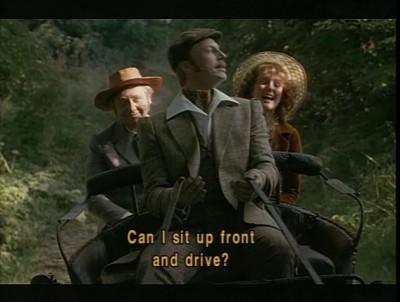 |
Without Witness (89 min., 1.33:1, 1983)
Without Witness is a charmless dramatic comedy about a single confrontation between a divorced couple set entirely in a Moscow apartment. A still-attractive middle-aged woman (Irina Kupchenko) receives an unexpected visit from her remarried ex-husband (Mikhail Ulyanov). Over the course of a few hours, the mask of civility gives way to open wounds, humiliation and vindictive depravity. Without Witness plays like an extended scene from Bergman's Scenes from a Marriage (1973), but without the believability.
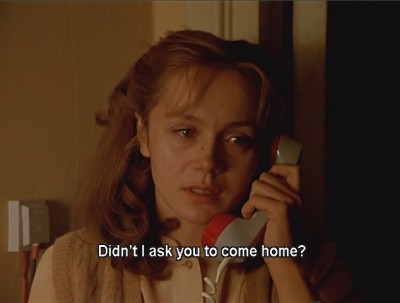 | 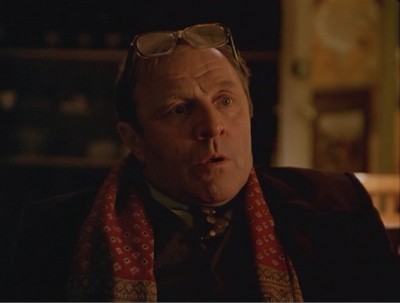 |
Burnt by the Sun (135 min., 1.62:1, 1994)
Mikhalkov directs himself in this bloated middlebrow-drama pandering to Russians collective nostalgic self-pity. Occurring on a single day in the summer of 1936 during the first year of Stalin's Great Purge, Burnt by the Sun portrays the last day of disabused innocence and freedom for the larger-than-life revolutionary war hero Colonel Sergei Petrovich Kotov (Nikita Mikhalkov). Kotov has it all -- the love of a beautiful wife and daughter, the admiration of his neighbors, the respect of his soldiers, and the personal friendship of Stalin -- so obviously he has nowhere to go but down.
The harbinger of Kotov's fall is the unexpected arrival of NKVD secret police agent Mitia (Oleg Menshikov), the ex-lover of his Kotov's wife Marussia (Ingeborga Dapkunaite). Though his visit is unexpected and certainly frightful given that he's accompanied by two NKVD stooges, Mitia and Kotov mask themselves initially in the guise of pleasant civility and friendship. Though Kotov's fate will be a surprise to nobody, it seems to take forever to arrive.
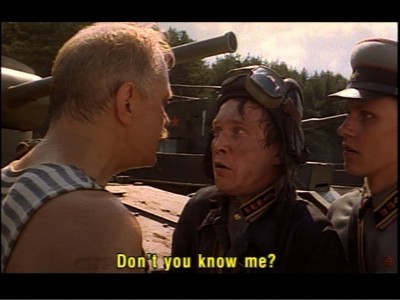 | 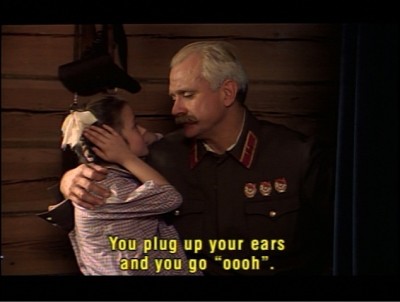 |
Presentation
The Films of Nikita Mikhalkov: Volume 1 is presented on five discs in separate standard alpha cases in a thin cardboard case.
Video & Audio:
Kino International has a reputation for releases that vary tremendously in quality with some approaching the heights of the Criterion Collection and others reaching the depths of Facets. This collection composed of ports from other studios is definitely among the latter.
Interlaced image, digital combing, moire effects, excess edge enhancement, washed-out or inconsistent colors, soft focus, and print damage bedevil these films as a whole, but the worst of the lot is Slave of Love which also suffers from atrocious image flutter.
All of the films include serviceable but unspectacular original Russia audio in stereo with optional English subtitles. Without Witness also offers an enhanced 5.1 Russian audio as well as English and French mono dubs which all sound horrid -- the 5.1 mix over emphasizes ambient noise, while the dubs feature talentless ham actors.
Extras:
Spread across the five discs are three interviews with Nikita Mikhalkov, three additional interviews with his collaborators, a featurette about silent screen star Vera Kholodnaya, as well as various filmographies and photo galleries.
Final Thoughts:
Like musty old issues of Time, The Films of Nikita Mikhalkov: Volume 1 is more valuable as a record of staid, middlebrow sensibilities of bygone days than it is anything of intrinsic value. Only Oblomov rises above the forgettable, and even then just barely.
|
| Popular Reviews |
| Sponsored Links |
|
|
| Sponsored Links |
|
|
| Release List | Reviews | Shop | Newsletter | Forum | DVD Giveaways | Blu-Ray | Advertise |
|
Copyright 2024 DVDTalk.com All Rights Reserved. Legal Info, Privacy Policy, Terms of Use,
Manage Preferences,
Your Privacy Choices | |||||||













